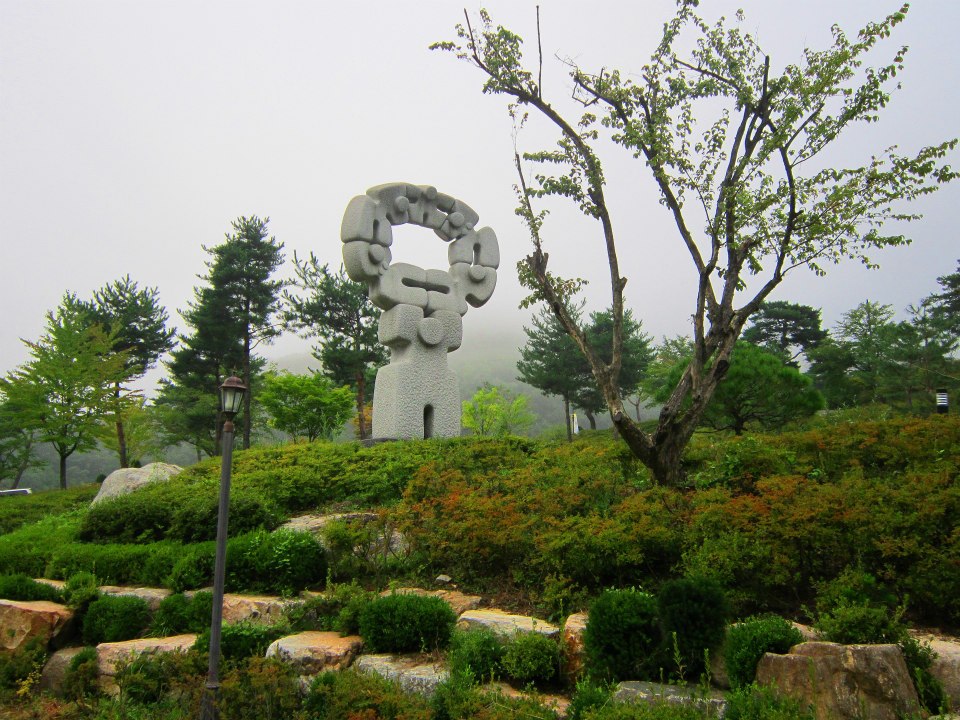
(photo 1)
By Taekon Lee (Bamboos Lee)

(photo 1)
Unchanging and Eternal
Unchanging
and eternal—the Absolute Being in all religions is depicted as
having these qualities. Conversely, all beings, things and phenomena
in the world are transient, impermanent and relative; from that
perspective, they cannot have a reciprocal relationship with the
Absolute Being. Human beings have both types of qualities: we value
what is unchanging, but at the same time we have changeable elements
that make us less than trustworthy. Becoming a person of
steadfastness and unchanging devotion is thus a key ingredient in
making a relationship to God.
Father Moon’s teaching on this
point focuses on true love, which likewise has the qualities of
unchangeability, absoluteness and eternity. He explains that even in
God, these attributes exist mainly for the purpose of relating to His
creatures in true love. Moreover, the demands of love test God’s
unchangeability every day as He relates to human beings who are
inconstant and treacherous.
I am the Alpha and the Omega, the
first and the last, the beginning and the end.
Revelation
22.13
|
|
|
|
|
|
|
|
|
|
|
|
|
|
|
|
He is the First and the Last,
the Outward and the
Inward;
and He is Knower of all things.
Qur’an
57.3
Jesus Christ is the same yesterday and today and
forever.
Hebrews 13.8
Nothing can ever destroy the Buddha
Nature.
Mahaparinirvana Sutra 220 (Buddhism)
The great,
unborn Self is undecaying, immortal, undying, fearless,
infinite.
Brihadaranyaka Upanishad 4.4.25 (Hinduism)
Moses
said to God, “If I come to the people of Israel and say to
them, ‘The God of your fathers has sent me to you,’ and
they ask me, ‘What is his name?’ what shall I say to
them?” God said to Moses, “I Am Who I Am.”
Exodus
3.13-14
Subhuti, if anyone should say that the Tathagata comes
or goes or sits or reclines, he fails to understand my teaching. Why?
Because ‘Thus Gone’ (Tathagata) has neither whence nor
whither, and therefore he is called ‘Phiri
P-tathagata.’
Diamond Sutra 29 (Buddhism)
With
the Lord one day is as a thousand years, and a thousand years as one
day.
2 Peter 3.8
Who knows the Eternal’s day and the
Eternal’s night, Each lasting a thousand ages, truly knows day
and night.
At daybreak all things are disclosed;
they arise
from the unmanifest.
At dusk they dissolve into the very same
unmanifest.
Again and again, the whole multitude of creatures
is born, and when night falls,
Is dissolved, without their
will,
and at daybreak, is born again.
Beyond that
unmanifest is another, everlasting Unmanifest
Which has no end,
although every creature perish.
This is called the
Imperishable
Unmanifest and the Highest Goal.
Who reaches it
does not return.
It is my supreme abode.
Bhagavad-Gita 8.17-21
(Hinduism)
All that is on the earth will perish:
But will
abide forever the face of thy Lord—
full of Majesty, Bounty,
and Honor.
Qur’an 55.26-27
In primal time, in all
time, was the Creator;
Nothing is real but the Eternal.
Nothing
shall last but the Eternal.
Adi Granth, Japuji 1, M.1, p. 1
(Sikhism)

(photo 14)
|
|
|
|
|
|
|
|
|
|
|
|
|
|
|
|
|
|
|
Being absolute, God is tested continually by the
world. Everyone—even Satan—tests whether God’s love
is unchanging. If God were ever unable to overcome a test and stopped
loving, then He would be changeable. Yet God remains calm and
unperturbed by anything. When I contemplated why God permits Himself
to be put through intolerable difficulties, I realized that He had to
endure them in
order to secure His unchangeability.
Satan and
God are completely opposite. God is eternal, while Satan is
transient; God is unchanging, while Satan is ever changing; God is
unique, while Satan is not. There is a clear contrast between the
characteristics of God and Satan.
Is your mind changing or
unchanging? An unchanging mind is closer to God. You prefer to be
unchanging, not changing, to be absolute, not relative, because you
want to take after God’s character. You would resemble God
because you wish to be His object partner.
God is unchanging,
eternal, unique and absolute, but for what end? If God possessed
these attributes purely for His own sake, they would have no meaning.
These attributes are for the sake of His object partners. Likewise,
we seek to be unchanging and absolute for the sake of our
counterpart, not for ourselves.
Therefore, no matter how many
people in the world oppose God, He must endure in silence. Evil
people swear, accuse and lash out at God, but He just takes it all in
and remains silent.
All people are meant to make the journey to
true love. Therefore, even evil people seek to become absolute,
unique, eternal and unchanging. Were we solitary beings, what
difference would it make if we were changing or unchanging? When we
say we want to be unchanging, we automatically have a relationship in
mind. Because of the unchanging relationship between God and human
beings, love can be possible. And love—true love—is
eternal. (123:330-32, January 9, 1983)
All the ideologies,
doctrines and rights that people hold—
all these will
disappear.
But Father, we yearn that Thou dost put in our
minds
power ever flowing and ever bursting forth,
the Eye of
resurrection,
that our minds and bodies may rise
to the place
where we can live eternally. (4:65, March 9, 1958)
|
|
|
|